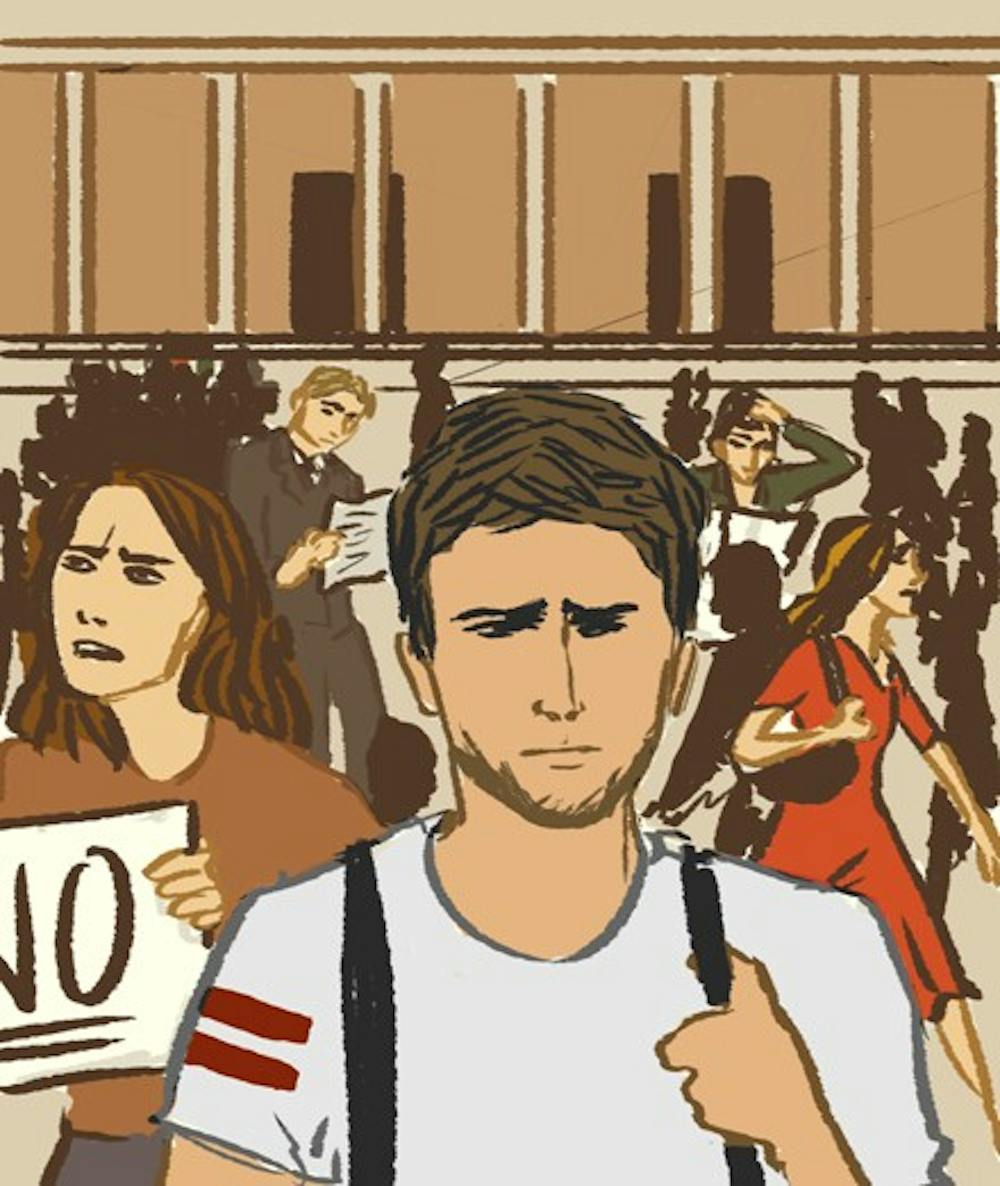As Leon Herrera studies at the University of Richmond, his friends and family in Madrid are haunted by Spain's economic and political unrest.
Herrera, a sixth-year student, is one of 20 Spanish students at Richmond this semester, said Sara Jaax, international education manager of internal communication and events.
"I feel kind of outside, or alienated, from all the turmoil," Herrera said. "I am concerned of course, but not like I used to be last year when I lived there. It is kind of a nice break from it. I am not proud of it though. I feel like I should be more involved."
The turmoil that Herrera refers to began after a 2008 financial crisis, when the unemployment rate soared in Spain. The country has also seen its deficits swell and has been forced to pay high interest rates because it has become the biggest worry currently facing investors and the European Union, according to a New York Times article published last week.
In April 2012, Spain's unemployment rate reached 24.4 percent, the highest in Europe, according to the Times. The European Central Bank pledged to buy bonds to lower interest rates, but President Mariano Rajoy refused. He instead announced major economic cutbacks for the country in late September, which resulted in protesters blockading the Parliament and a call from the Catalonian leader for an early election on Nov. 25 that could turn into an unofficial referendum on whether to split from the rest of the country, according to the Times.
"I see a lot of my friends who have just graduated and can't find jobs because it is so difficult for them to do so," Herrera said. "The outlook in the country is a grim one. There doesn't seem to be a lot of hope among people concerning the recovery and trusting of politicians to take us out of this."
Youth unemployment is also what worries fourth-year student Joseba Mendivil of Bilbao the most, he said. Mendivil already has a job in computer programming, but he has watched his sister struggle to find work after recently losing her job, he said.
"Years ago, all of the Spanish economic system was based on tourism and construction," Mendivil said. "But now, tourism has decreased a lot because of the poor international economy, so people do not travel as much. I wish I was there [Spain] to be involved, but there are a lot of groups protesting, and I just do not think that is the way."
Although the majority of protesting takes place in Madrid, Mendivil said he had seen some in Bilbao, as well. Spaniards are mostly protesting the decisions made by political leaders, such as cutting economic help for citizens, he said.
A movement is necessary in order to gain political justice, said Jon Vazquez, a senior from the Basque region of Spain. Most Spanish politicians are taking advantage of their positions of power, and they don't care about the people who voted for them, he said.
Protesters in Madrid have become so normal and accepted that they do not really affect everyday life, Herrera said.
Enjoy what you're reading?
Signup for our newsletter
When Spaniards blockaded the Parliament in September, Herrera tried to read newspapers to figure out what was happening, he said.
"It is kind of hard to be involved, though, because I have a lot of work to do here," Herrera said. "But, I talked to my friends, and basically they tell me that the boat is sinking."
Herrera has been interested in the relations between Catalonia and the rest of the country for years, he said. If the region separates from the rest of the country, it will negatively affect Catalonia and the rest of Spain, he said.
"I think that the Spanish government is approaching it totally wrong," Herrera said. "If the Spanish government keeps sending messages, such as the one that they sent a month ago, than they would be willing to use military forces or suppress the regional autonomy, Catalonia will win the referendum. If the government approaches it in a more mature and democratic way, they will not separate."
Mendivil thinks that the referendum is positive, but that it should be nationwide, he said. All Spanish citizens should be able to decide whether they want Catalonia to separate because that is democracy, he said.
"If the people think it is best, I think it is OK for them to separate," Mendivil said. "I think it will be negative for them [Catalonians], and I think it will be negative for the country, as well."
Vazquez believes that only the citizens of Catalonia should be able to decide whether they want to separate from the country, he said. The rest of the country should have no voice in the decision, he said.
"If Catalonia wants to separate, let's make a referendum and see the results," Vazquez said. "However, the separation would have consequences, whatever they might be."
Herrera and Mendivil said that Americans were more interested in politics than Spaniards. People in Spain are just interested in casting a vote every four years, and typically base their decisions on the political party that their parents support, Mendivil said.
"I really like the way that people get involved in the election here [the United States]," Herrera said. "I can see that people care and that they know what is going on, and what is at stake. I don't think we have the same in Spain. Americans take it more seriously and actually check whether or not politicians are telling the truth."
Contact staff writer Erin Moyer at erin.moyer@richmond.edu
Support independent student media
You can make a tax-deductible donation by clicking the button below, which takes you to our secure PayPal account. The page is set up to receive contributions in whatever amount you designate. We look forward to using the money we raise to further our mission of providing honest and accurate information to students, faculty, staff, alumni and others in the general public.
Donate Now



